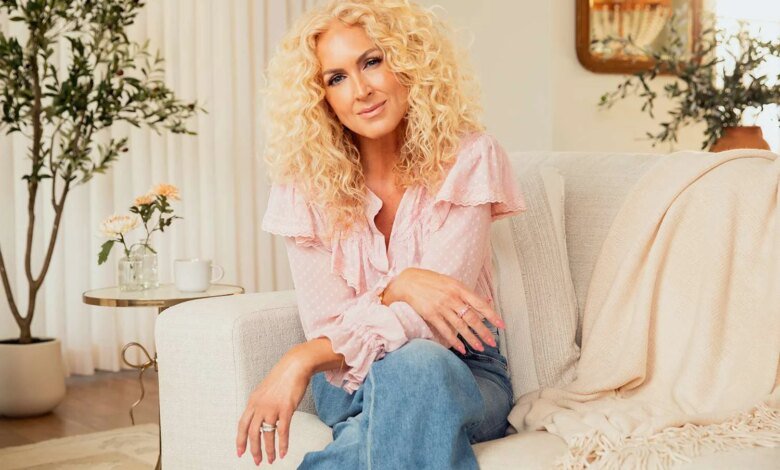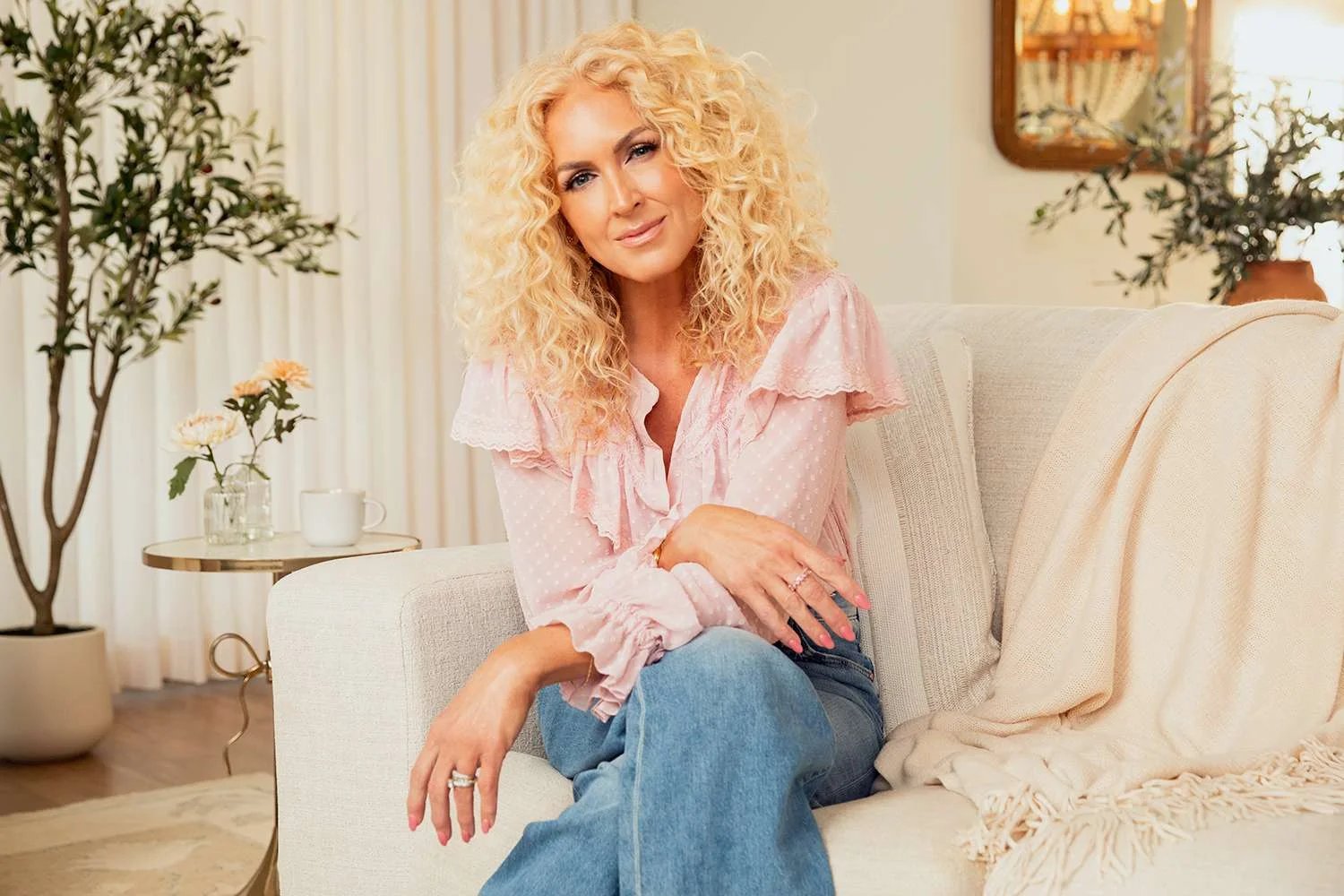Why She Moved Out Of Nashville (Exclusive)


NEED TO KNOW
- Little Big Town’s Kimberly Schlapman moved with her husband and their two daughters from Nashville to South Carolina this summer
- The singer and her husband built their new home not far from the Georgia town where Schlapman grew up
- Schlapman wanted to live closer to her parents so she could help care for her mother, who has been living with Parkinson’s disease for two decades — and whose symptoms have worsened in recent years
Kimberly Schlapman knew that one day she wanted to return to live near her childhood home.
The singer hit the big time in Nashville two decades ago with multi-platinum country quartet Little Big Townbut the North Georgia native and her husband “always planned to move closer to family,” she tells PEOPLE.
Their plans sped up, however, after Schlapman’s mother, who has been living with Parkinson’s disease for 20 years, saw her symptoms worsen. “She’s had horrific falls. She has broken ribs, ankles, her wrist, shoulder, elbow, so many things,” she says of her mother Barbara, 77, a former elementary school teacher, “That’s one of her greatest struggles, her balance, it’s really, really bad.”
Allister there
So this summer, Schlapman, 55, and her husband Stephen moved with their two girls, Daisy18, and Dolly8, from Nashville to a home they built outside Greenville, South Carolina. The home is on a lake where Schlapman spent much of her childhood, just an hour from her parents, who live in her grandparents’ farmhouse in northeast Georgia, just across the state line.
“Not only did I want to get close to family just because I love them so much, now I’m needed,” says Schlapman, who is partnering with pharmaceutical company AbbVie on a new advocacy campaign, Changing the Tune of Parkinson’s Diseasefor people living with the disease and their loved ones. “I need to be here to help my siblings, and my daddy, care for my mama.”
The first signs of her mother’s illness 20 years ago went unrecognized at first, Schlapman says.
In 2005, just before Little Big Town released their breakout single “Boondocks,” the Grammy-winning “Girl Crush” singer lost her first husband, Steven Roads, when he died suddenly of a heart attack at the age of 41.
John Shearer/Getty
In the painful days that followed, Schlapman’s mother stayed with her in Nashville “and I saw a tremor in her hand,” Schlapman recalls. “My sister saw it, my brother saw it, but we just thought it was part of the grief. I had lost the love of my life, and she was in great grief just trying to take care of me as best she could. So we didn’t really think much of it, because it was at a time when we were all a total mess.”
Months later, the tremor hadn’t gone away. And her mom noticed that when she walked, her left arm wasn’t swinging. A neurologist diagnosed her with Parkinson’s, a degenerative disease in which brain cells that produce dopamine, a chemical that controls movement, stop working or die. It can cause tremors, stiffness and balance issues, as well as depression, memory issues and other neurological problems that worsen over time.
“It flabbergasted all of us,” Schlapman says. “No one in our family has ever had Parkinson’s, that we know of, so when she got that diagnosis, we were blown away — and very uneducated about what that means.”
For the first 10 years, “no one would’ve ever guessed that she had Parkinson’s,” she says. But then, the symptoms ramped up. “She struggles with things like feet freezing which is where your feet freeze to the ground, your brain says they need to go, but physically your foot doesn’t move. When your body does, you fall.” It’s not uncommon, she says, for her mother to fall multiple times a day.
As a result, her mom now needs 24-hour care. “It’s definitely a big family thing,” Schlapman says. “Everybody’s still in our little hometown where we grew up. Nobody left but me, and now I’m back. My sister is kind of our quarterback. She works the calendar and has everybody fills up every single spot. My brother is an incredible cook, he’s always taking food over there and staying with them. We have grandkids involved, sometimes they spend the night. We’re all in.”
Leaving Nashville, where her girls grew up, wasn’t easy, Schlapman says.
Kimberly Schlapman/Instagram
“It’s the only home they’ve ever known,” she says. “Our older daughter, especially, Daisy lived there since she came home from the hospital, and she’s extremely sentimental. So it was very difficult for her.” They waited until Daisy, who is now at college studying to become a child counselor, graduated high school to move. Dolly, meanwhile, has started school in South Carolina and “is making friends here like crazy.”
And they have kept a small place in Nashville “because I’m there almost every week!” She jokes that she’s not sure her bandmates, Karen Fairchild, Jimi Westbrook and Phillip Sweet have even noticed she’s gone. “We just finished up a big tour this summer. We’re still doing dates, we’ve got all kinds of stuff going on. So I still see them as much as I would normally.”
Gilbert Flores/Penske Media via Getty
Never miss a story — sign up for PEOPLE’s free daily newsletter to stay up-to-date on the best of what PEOPLE has to offer, from celebrity news to compelling human interest stories.
Both her daughters spend time with their grandmother and they have learned an important lesson in being with her. “My children, all my mother’s grandchildren, are at a second’s notice ready to help her,” says Schlapman. “They’ll be like, ‘Hey, Mamaw, let me help you up,’ or, ‘Let me help you down the hallway.’ They are very attentive to looking outside themselves to someone in need and that definitely has been a blessing. It has struck me so profoundly that that is one thing Parkinson’s has given us as a family: It has given us deeper hearts.”
That’s not to say there aren’t major challenges as they watch their mother’s disease progress.
Much of what she loves to do is no longer easy for her. “She’s the best cook I know and she taught me everything I know,” Schlapman says. “She taught me that’s how you take care of people. If you want to love on somebody, bake them something. But in the past couple of years, it’s really hard for her to go back and forth from the countertop, to the stove, to the refrigerator.”
Those quick movements can cause falls, she says. “She wants to cook so bad, and it is heartbreaking,” she says. “She can’t buzz over to the pantry and grab something extra she wants for her recipe. She just got to stand there and say, ‘Can somebody please grab me the vanilla flavoring? I know it sounds very simple, but for my mother, it’s incredibly hard for her just to stand still.”
Allister there
She can no longer drive and uses a rolling walker at all times, and she’s had to let her family and helpers do many of the things that she’s always taken pride in. “Her house has always been spotless and it still is. But she just loves to do, she wants to wash the windows, she wants to clean the carpets, she wants to do all the things that now we try to take up for her as family members. There are so many limitations to her life right now.”
Schlapman says she’s learned that as a caregiver, it’s a careful balancing act. “It’s really important, when you’re caring for somebody, to understand how it feels to have so much taken away from you,” she says. “We don’t want to be bossy and be like, ‘You can’t do that. We want to be very gentle because the fact that her life has completely changed is not her fault at all. It’s not fair, it’s not her fault.”
Her mom is “such a little fighter, and she’s never going to give up. She handles it so well. When I take her to physical therapy, they’ll be like, ‘Let’s do 10 of these exercises.’ And she says, ‘Can I do 20?’” Schlapman says.
Allister there
“But watching her struggle, watching her not be able to walk on her own, watching her not be able to run to the kitchen and make a batch of biscuits, it’s heartbreaking,” she says. “What my sister and brother and I have learned to do is advocate for her. When we go to appointments with her, we want her to say exactly how things have changed. The information we give doctors and researchers is so incredibly important. Parkinson’s is incredibly tough. It’s a family disease, it affects everyone. But I believe there’s going to be a cure. Will my mama benefit from it? I’m not sure. But I believe that it will happen.”
Disclaimer: This news article has been republished exactly as it appeared on its original source, without any modification.
We do not take any responsibility for its content, which remains solely the responsibility of the original publisher.
Disclaimer: This news article has been republished exactly as it appeared on its original source, without any modification.
We do not take any responsibility for its content, which remains solely the responsibility of the original publisher.
Author: uaetodaynews
Published on: 2025-10-14 16:59:00
Source: uaetodaynews.com




